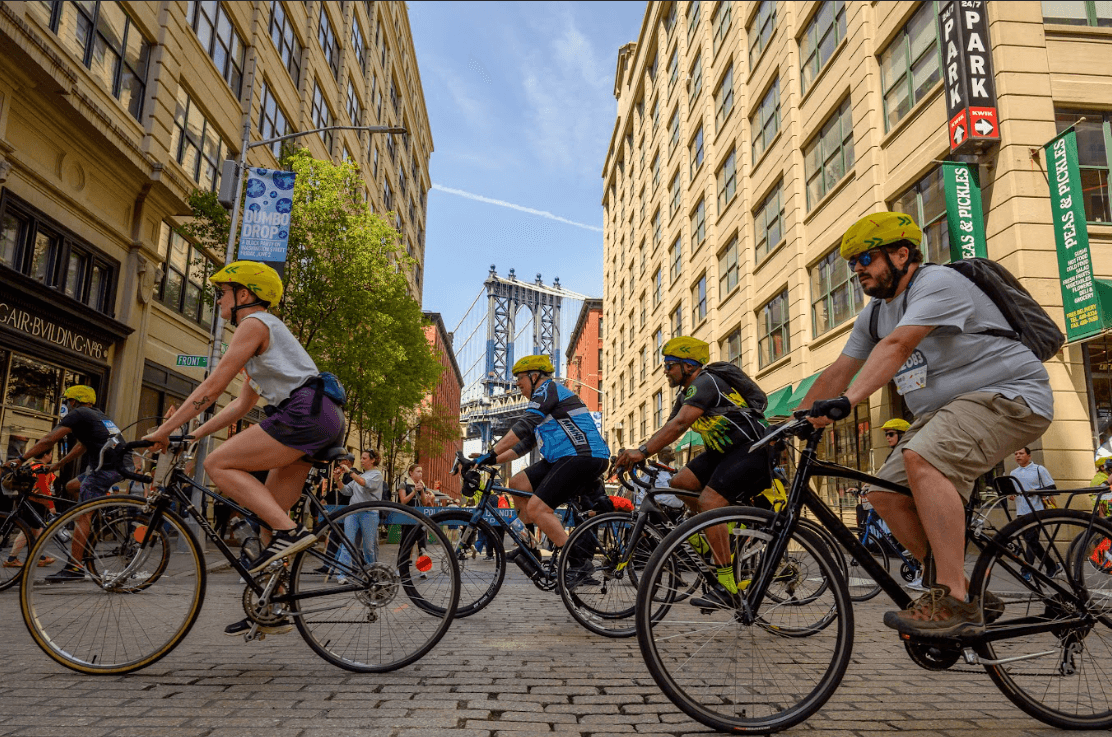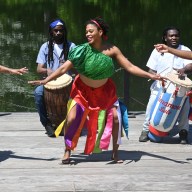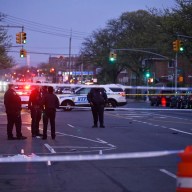By Helen Klein
Brooklyn will soon have a state-of-the-art sports complex that its developers say “will redefine sports and entertainment in the metropolitan New York area.” Currently under construction at Floyd Bennett Field, the multi-million-dollar complex is being developed by Aviator Sports & Recreation, and is expected to open as soon as September of this year. Remarked Marcus Minifee, vice president of marketing and corporate partnerships for Aviator, “I think Brooklyn and Queens are not going to believe their eyes – that there’s something like this in their own backyard.” The extensive project is being built as the result of a Request for Proposal (RFP) that had been issued some years back by the National Park Service (NPS). Floyd Bennett Field is part of the Gateway National Recreation Area, which is administered by NPS. A 20-year contract to develop and operate the sports complex was awarded to Aviator in April, 2003. The complex, which incorporates both indoor and outdoor space, is targeted at a wide range of athletic interests. Being built inside four of the airfield’s historic hangar buildings that are being linked together underneath a single roof, are two NHL regulation ice hockey rinks (one of which has seating for 1,500 spectators), a 17,000-square-foot gymnastic center, a 28,000-square-foot field house that will accommodate sports such as basketball, volleyball and handball, an 8,000-square-foot sports bar and restaurant and an 8,000-square-foot food court, which, said Minifee, “Is going to feature all the best foods in Brooklyn.” In total, the indoor complex is 170,000-square-feet in size. Outside, adjacent to the hangars, there will also be two full-size turf soccer/lacrosse fields as well as a ?-mile-long track for running and walking. In addition, there is free parking for over 5,000 cars, added Minifee. Two Key Goals “We are trying to do two things,” noted Representative Anthony Weiner, who has made the revitalization of Floyd Bennett Field and Gateway a priority. “We are trying to reverse literally a generation of neglect, and show real, tangible improvements that people can see, and we are trying to find some innovative way to expand services.” Innovation is a key in a park that is, in many ways, unlike the typical national park. The urban park, Weiner stressed, is one that caters to, “People who come in yellow buses rather than Winnebagos.” Recalling that he had “pledged,” when first elected, to help create public-private partnerships that could function to the benefit of area residents, Weiner said that the conversion of the hangars was the first step in that ongoing endeavor. “They (Aviator) are taking almost all the risk on themselves and almost all the money is theirs,” he noted. “Some taxpayer money is going for basic infrastructure things, but most of the money is coming from the company taking the risk. They stand to gain, but so do we, by having these facilities.” At the time the contract was awarded, officials had estimated that the complex could generate as much as $5 million a year in revenue, when fully operational. Getting NPS to salute the somewhat novel approach to reinventing the cluster of hangars at Floyd Bennett Field had been a bit of a challenge, Weiner recalled. But, he stressed, “We are never going to be able to get enough tax dollars into this to make the park everything it can be.” For that reason, he said, he would continue to, “Encourage the National Park Service to do more things like this.” Lots of Opportunity The facilities at the complex, said Roy Edmonson, vice president of programming and special events for Aviator, will provide ample opportunities for participation sports. “We will have a hockey program, a figure skating program, a learn to skate program, a basketball program, a gymnastics program, a futsol program, a soccer program, team handball,” he enthused, adding, “We have the ability to do a number of additional programs depending on the demand of the Brooklyn-Queens marketplace. If there’s something that’s being under-served, we think the facility is a flexible enough space that we will be able to adapt.” Futsol is indoor soccer played on a basketball court. While the focus is clearly on recreation rather than entertainment, the complex is being designed to handle a wide range of programming: League play, professional exhibitions, tournament play, educational clinics and specialized summer camps, among them. Programs, said Minifee, will be developed for young athletes as well as adults. There will also be programs developed through a not-for-profit organization founded by Aviator. Dubbed Wings, the foundation’s purpose, said Minifee, is to, “Create opportunities for kids in the inner city to do recreational sports. It’s something we’re very proud of.” While, said Edmonson, the facility will feature, “Predominantly team sports or our own programs,” he noted, “We will have opportunities for organizations or individuals to rent the facility.” Pricing for that, Edmonson added, is “yet to be determined.” The field house, noted Edmonson, will be a bit of a chameleon. “We will be able to convert it to a hall to host banquets, concerts, parties, proms,” he explained. “With the parking situation, it’s really an ideal location for hosting special events.” Nonetheless, Edmonson added, the complex is, “Predominantly for recreation. There’s no doubt about that. It’s the main purpose of the facility. But, do we have the ability to bring in the Rangers to host a rookie game? Yes we do. But, that’s a special event, not a regular event.” That is in keeping with the approach that Weiner has advocated. “A steadfast rule I have is that you can do recreation in a national park, but you can’t do entertainment,” he explained. ‘You may have high school hockey team that plays a game there, but you’re not going to have a NHL playing season there. You might have them coming and doing an exhibition there, but spectator sports are not what a national park is for.” Sensitivity to History Aviator, said Minifee, approached the project with a sensitivity to the airfield’s long and storied past. For many, Floyd Bennett Field is, in effect, hallowed ground, New York City’s first municipal airport and a major airfield during World War II. “We are looking to revitalize the area, which became economically obsolete after the war because it lost the postal service contract to Newark and JFK,” stressed Minifee. After being decommissioned, he said, despite being incorporated into Gateway, the field was, “A part of the Brooklyn and Queens area that was unused for so many years.” The construction now ongoing, he said, involves, “Restoring the historic airplane hangar that Amelia Earhart and Howard Hughes used to house their planes.” While the work being done, said Minifee, involves, “Totally renovating the inside of the hangars,” the outside will be kept intact. “We will adhere to the historic and unique context of the buildings,” he stressed. Outside, greeting visitors, will be a replica of a Lockheed plane flown by Earhart from Floyd Bennett, which used to be housed in the hangars that are being reinvented as the sports complex, said Minifee. Keeping the historic context of Floyd Bennett Field intact was a key to the project’s moving forward, stressed Weiner who said that his goal was, “A synergy between the historic and the recreational sides. “One of the criteria I argued for early on is that they had to build something there that was respectful of history,” he noted. “It added a little expense,” he acknowledged but, he said, “We expect the visitors to the sports facility to take the time to learn about Floyd Bennett Field. Even people living within a mile of Gateway haven’t set foot within the national park. Hopefully, this is a way to get them to, and also to get access to recreation that isn’t available for miles around. There’s no reason to go to Chelsea Piers if you are able to go to a local national park and find a world-class facility that’s a change for the better.” New Entrance Access to the complex will be different from past access to Floyd Bennett Field. Minifee said that Aviator is, “Creating a new curb cut just past the Ryan Visitor Center.” In addition, he noted, there will be a second entrance that will be “used for special events to let people out.” That entrance, Minifee said, will be located, “Just north of the soccer field on Flatbush Avenue.” For those using public transportation, Minifee said that Aviator was in the process of working out an arrangement with the Metropolitan Transportation Authority (MTA), “To bring buses onto the field and drop people at the front door.” Registration for various programs is still in the planning stages, said Edmonson. Registration, he noted, may be on-site or on-line. In addition, he said, “This spring and summer, we plan on running tours of the facility for people.” Pricing, he added, “Is right in line with what the rest of the Brooklyn marketplace is charging. We are going to be competitive with those prices. “For the residents of the area, this is something that’s been a long time coming and is desperately needed,” Edmonson added. “We are ready to accept the Brooklyn and Queens community with open arms to come to a world-class sporting recreation facility and enjoy top level recreation.” Aviator Sports is a corporation that was specifically formed to develop the sports complex at Floyd Bennett Field. Its principals include individuals with a long history of involvement in sporting ventures, including a former owner of the New York Islanders and the Phoenix Coyotes, as well as a co-founder of Manhattan’s popular recreation complex, Chelsea Piers.

































